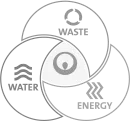Hurricanes are extremely powerful natural events. These strong storms can have winds of 150-170 mph or more. When they reach land, they can cause very serious damage. That's why it's important to start thinking early about getting ready for hurricanes and how to keep your family, home, things you own, and business safe. Here are some important tips to help you prepare for hurricanes.
Hurricane watch vs. warning
Understanding the difference between a hurricane watch and a hurricane warning is really important. Let's break it down.
What's a hurricane watch?
If you live in parts of the southeastern coastal United States, you're likely to hear about a hurricane watch each year. But this doesn't mean a storm is definitely on the way. A hurricane watch is issued when conditions suggest that a hurricane might happen. It comes 48 hours before the possible storm arrival. If there's a hurricane watch, it's smart to go over your evacuation plan and get your home ready, just in case a storm does show up. Keep a close eye on updates from local officials about the weather.

Veolia is uniquely positioned to service industry, government and commercial entities in improving performance, managing water, waste and energy.
Learn how
Hurricane safety tips
Before a hurricane
Here's how to get ready for a hurricane if it might hit your area:
- Stay informed by listening to local radio, watching official news, checking community websites, and keeping an eye on TV for warnings or safety instructions.
- Prepare a bag and plan where you'd go if you have to leave. It's good to be ready just in case.
- Get some emergency supplies, but remember, others will need them too.
- Strengthen your home's outside, especially doors, windows, walls, and roofs.
- If you have time and it's safe, bring inside things that could fly around in strong winds.
- Secure outdoor items that can't come inside, like fuel tanks.
- If officials don't tell you to go to a public shelter, gather your family in a basement, a closet, a small room, or a hallway away from windows. The more walls between you and outside, the safer.
- If you have time, look over your insurance and make a list of your stuff.
During a hurricane
The choices you make during the storm really matter. Here are some things you can do:
- Listen to what local officials say. If they say you should leave, do it and use the plan you made. Remember your emergency bag.
- Don't go near windows. Stay in the safest part of your home, preferably on the lowest level.
- If flooding happens, go to higher areas.
- Never try to walk or drive through floodwater. It's really dangerous.
After a hurricane has passed
- If you and your family had to leave your home, or if your home got really damaged by the hurricane, wait for the okay from authorities before going back.
- Watch out for floods that might happen after the hurricane and stay away from them. Don't try to walk through floodwater.
- Be careful of power lines, trees, and poles that might have fallen. Some might still be standing but not safe.
- Wait until your home is checked for damage to things like electricity, gas lines, septic systems, and water pipes before going inside.
- If it's dark, use a flashlight – don't use matches, candles, or lighters. There could be gas leaks that catch fire.
- Don't drink tap water until local officials say it's safe.
- If there's a lot of water damage, you might want to get experts to clean it up.
- Start cleaning up as soon as you can – wash and disinfect things that got touched by floodwater, and throw away things that can't be saved. Wear gloves and strong shoes. Don't try to move heavy stuff by yourself.
- After you've collected important papers and proof (photos or videos), get in touch with your insurance company or agent.
This information is provided by Veolia North America to help you protect you and your family's safety. Content is drawn from Nationwide.


